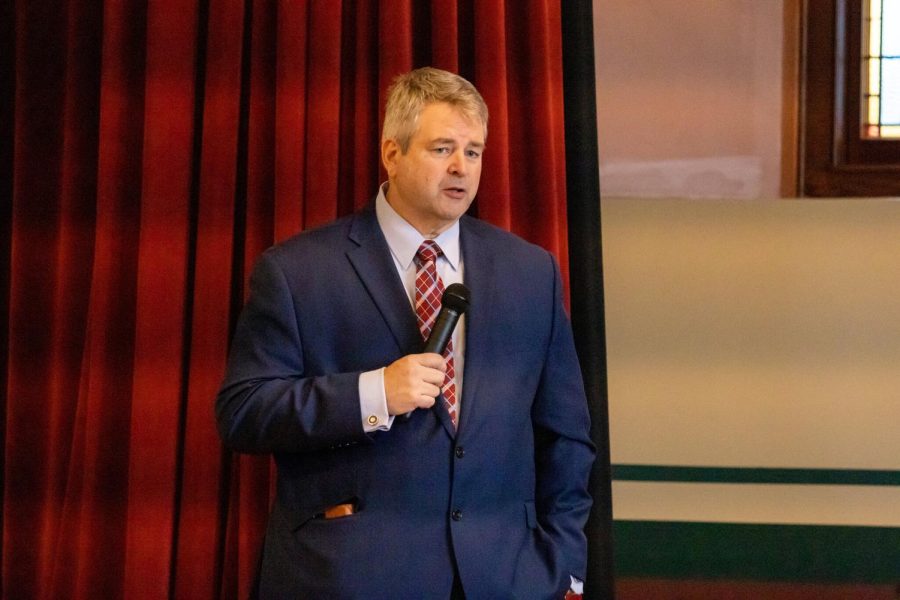Paul Tikalsky, one of two finalists for the role of chancellor at the University of Massachusetts, visited the campus on Friday, Feb. 10. During two public listening sessions, he answered questions from students, staff and faculty members.
Tikalsky explained how he hopes to advance UMass’ standing in national rankings and improve the campus climate. He noted his accomplishments as dean of the College of Engineering, Architecture and Technology at Oklahoma State University. Over 60 UMass community members joined two in-person listening sessions, with more streaming the conversations online.
“I lead big parts of a major university, I’ve created success, raised about $250 million to help the students and faculty at my institution, and it’s time to move on,” Tikalsky said. “You have to turn leadership over, and just as you see [current Chancellor Kumble Subbaswamy] retiring, it’s time for another leader here.”
When Tikalsky arrived in Amherst Thursday night, he said that he immediately “ran out the back door” of Hotel UMass to explore campus and interact with students. At the W.E.B. Du Bois Library, he “picked any floor” and landed at the Learning Resource Center, where he learned about the academic support student tutors provide to their peers. In the Campus Center basement, he spoke with student leaders who were hosting a club fair.
“It was a way for me to see and just talk to students who don’t expect to see me,” Tikalsky said. “[It] just showed me the extraordinary nature of your students… Everyone could tell me what they’re doing there, why they’re doing it and what their passion is. That is impressive.”
Junior biology major Oluwole Fabikun asked Tikalsky how he plans to address anti-Black instances on campus. 48 percent of responses to the 2021 campus climate survey said they were dissatisfied with the current racial climate at UMass; over a third of those who answered dissatisfied said they were “very dissatisfied.”
“We have to make sure the environment is supportive of every group, race, creed, color, religion, gender, ability,” Tikalsky said. “We’ve got to look at those kinds of things and make sure that the campus has the support that all those organizations need…We’ve got to find ways in which to showcase the greatness of those students.”
Tikalsky said he had established engineering societies for marginalized students, including the OSU chapter of the National Society of Black Engineers, Society of Hispanic Professional Engineers and the Society of Women Engineers.
“Whether it’s a conscious bias or unconscious bias… when freshmen come to college, they’ve never been around somebody like you,” Tikalsky said.
“What you see in the freshman class as they move forward is they realize the Society of Black Engineers [tutors] Thursday night, the Society of Women Engineers [tutors] Wednesday night, Hispanic students Tuesday night, and so forth. They realize that [students from marginalized communities are] the smartest ones in the group,” Tikalsky said. “That bias starts to wash away, and they realize, ‘I need really smart people to help me get through college.’”
Fabikun then asked Tikalsky to further expand upon his answer and explain how UMass can support students of color beyond the classroom.
“It’s a tough question,” Fabikun said. “I just feel like he went around it.”
“I want [the chancellor] to not be scared to stand up for whatever group is being antagonized,” Fabikun said. “The first answer, his natural answer to that question, showed that he didn’t really want to hit it. In terms of racism, it is what it is… So let’s not walk around it.”
Tikalsky expressed interest in expanding UMass’s scholarship pool, reflecting on his experience as a first-generation college student who won a merit-based scholarship for engineering.
“We’ve got to figure out the finances of the University and the kinds of things we can do to create better student resources or scholarships,” Tikalsky said. “How much funds need to be raised in order to support the scholarships we need to [support] not just kids who have economic need, but also kids who have fantastic merit.”
When asked how he plans to expand housing for undergraduate and graduate students, Tikalsky noted that the competitive housing market is not unique to the Pioneer Valley. “It is difficult. It’s the same in every college town, it’s the same in the one that I exist in,” Tikalsky said.
“It takes time, it takes money, and you have public-private partnerships going on right now to help you address these things because the legislature can’t address it fast enough,” he said.
“I don’t have great solutions,” Tikalsky said. “We have to engage with private entities to help build student housing and help us.”
Graduate Student Senate President Linet Preshma Pereira felt dissatisfied with Tikalsky’s answer.
“He wasn’t action-oriented,” Pereira said. “Even his answers from what experience he’s had didn’t really satisfy… the kind of experience my chancellor should have.”
Student Government Association Secretary of University Policy Tess Weisman said listeners may have been surprised by Tikalsky’s unfamiliarity with the priorities of UMass students.
“We really want a chancellor that knows about the climate of UMass before [they are] applying,” Weisman said. “I think he had a general understanding of it, but obviously it’s hard when you’re not on campus all the time.”
“When you interview for a job like this, they let you walk around the buildings, look inside the windows, but they don’t let you go inside and open the drawers,” Tikalsky said. “So I don’t know what all the issues are.”
“The first priority is to listen to people,” Tikalsky said.
Other chancellor finalist Javier Reyes also participated in two listening sessions on Feb. 13, which you can read about here.
Sophie Hauck can be reached at [email protected].



















